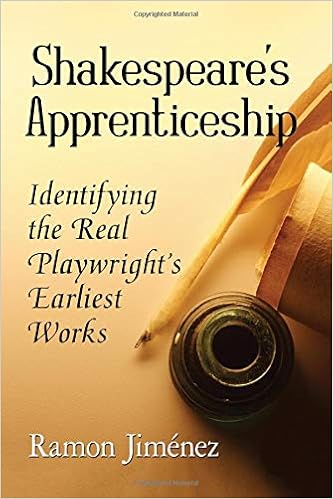In the throes of a pandemic comes the Spring 2019 issue of the Folger Library’s Shakespeare Quarterly, delayed by problems in manufacturing; but no matter: a quick look at the contents page indicates that one of its articles undoubtedly mentions Edward de Vere.
Matthew Steggle, a Professor of Early Modern English Literature at the University of Bristol, UK, offers a well-researched piece titled “John and Laurence Dutton, Leaders of the Queen’s Men,” unwittingly supplying more evidence that mainstream scholars are inexorably moving “Shakespeare” and the Earl of Oxford closer together. How long will it be before they realize that the two were one and the same?
In addition to supplying new information about the Dutton brothers, Steggle includes the known history that in 1580 they moved with the rest of Warwick’s actors to Oxford’s company; and that “it was as one of Oxford’s Men that Laurence became involved in a brawl at the Theatre in April of that year.” Then in 1583, John Dutton was moved from Oxford’s Men to the newly formed Queen’s Men as one of the company’s founding players
The Queen’s Men soon dominated performances at Elizabeth’s court and began relentlessly touring the country. Steggle reports that the Duttons performed both at court and on tour for the company during that decade; and “between 1588 and 1593 they were co-leaders of the Queen’s Men, the most significant theatre company of its era.” It appears the brothers “were in charge of that company when it produced many of the best-known of its nine surviving plays. And if as is widely thought, Shakespeare was involved with the Queen’s Men in some way in his early career, then he would have had to work with the Duttons.”
I have placed that last sentence in italics to highlight how this conjecture (that Will Shakspere may have spent his “lost years” with the Queen’s Men) is now “widely thought” by current scholars to be true. If past practices are followed, it will not be long before the conjecture is offered to the world as fact.
We have seen this coming ever since Scott McMillin and Sally-Beth MacLean published their seminal work The Queen’s Men and Their Plays in 1998, stating: “The plots of no fewer than six of Shakespeare’s known plays are closely related to the plots of plays performed by the Queen’s Men.” They suggest, therefore, that the great author may have acted in those histories in the 1580s and memorized their lines, enabling him to plagiarize them for his own versions in the 1590s! The young man from Stratford-upon-Avon also may have collaborated on those early plays for the Queen’s Men! After all, how else could he come up with the same plots with similar scenes and even dialogue?
ln his 1928 documentary biography of Oxford, B.M. Ward called attention to the earl’s association with the Dutton brothers. In 1583, when John Dutton was moved into the Queen’s Men, the company made its first court appearance in that Christmas season. “On January 1st a performance was given by Oxford’s Men,” Ward writes, “and as John Lyly [the earl’s secretary] appears in the Chamber Accounts as payee for the company on that date, there is every reason to believe, with Edmund Chambers, that the play acted was Lyly’s Campaspe. On March 3rd both Oxford’s and the Queen’s men performed; once again Lyly was payee for Oxford’s, and Sir Edmund confidently conjectures that the play acted was Sapho and Phao.”
“It seems unreasonable to suppose that two plays were presented on this day,” Ward continues (with my emphasis). “The most likely solution, therefore, would be that the two companies were amalgamated and rehearsed by Lord Oxford’s private secretary John Lyly, the author of the play. No other adult companies besides these two appeared at Court during this season.”
Ward suggests that Oxford “loaned” Lyly as stage manager and coach for Elizabeth’s new company. Lyly continued in Oxford’s service through the 1580s while also maintaining some “unofficial capacity” with the Queen’s Men. All of this brings Oxford into contact with that same company and its early versions of Shakespeare’s history plays.
Added to this picture is Elizabeth’s grant to Oxford, in 1586, at the height of wartime preparations for the Spanish Armada. The grant consisted of one thousand pounds per year, paid according to the same formula used to provide funds for Secretary Francis Walsingham and his secret service. Among Walsingham’s activities was use of the Queen’s Men for patriotic propaganda and the enlistment of its actors as informants, reporting on what they saw and heard around the English countryside while on tour.
As the Shakespeare scholars make their way down the biographical timeline of Will Shakspere, back down into the 1580s, they keep bumping into Edward de Vere and his associates such as Anthony Munday and Thomas Watson, among other writers including those working with the earl at Fisher’s Folly; and they also keep bumping into those early versions of the Shakespearean history plays. Dare they suggest he collaborated on, say, The Troublesome Reign of King John or The True Tragedy of Richard III? Once out on a long limb, there is little choice but to keep crawling farther out until it breaks; and when it does, they will fall straight down to where Edward de Vere, the 17th Earl of Oxford, the true author of those plays (both early and later versions) has been waiting.
/////
Note: Here is what our mainstream brethren might read to see the latest scholarship on this issue from a point of view other than their own: the splendid work of Ramon Jimenez published in 2018:
.






